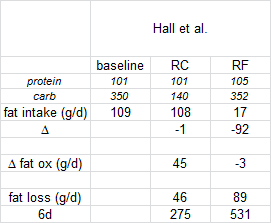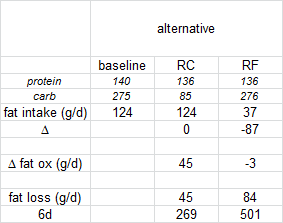Some people say the study design was rigged to favor the Low Fat diet (LF), which is dirty business but not exactly criminal; sometimes, this happens in science.
The claims go something like this: baseline diet was so high in carbs that they were locked into making unreasonable adjustments to formulate isocaloric low fat and low carb diets; eg, fat was too low in the low fat diet and carbs weren’t low enough in the low carb diet.
The biggest finding was “Fat Imbalance,” which favored LF. Here’s why I don’t think the baseline diet mattered very much.
Tl;dr: drastically cutting fat intake (LF diet) is much more effective than upregulating fat oxidation (LC diet) to create a large Fat Imbalance in an acute setting, ie, THE FIRST SIX DAYS.
Red flag alert: the 6 day cumulative fat imbalance was two times greater on the low fat diet. We know that under highly controlled experimental conditions, these diets should yield roughly similar changes in weight over time. That alone should put a red flag on the use of “Fat Imbalance” in this context.
I’m not sure why the numbers don’t match Hall’s exactly, but they’re close enough to make this point. The change in fat oxidation on the RC diet (45 g/d) would have to be doubled (100% higher) to make the 6 day Fat Imbalance match that on the RF diet. DOUBLED.
Assuming similar changes in fat oxidation rates (or not), this is still far short of correcting the overall difference in Fat Balance. However, a lower level of carbs may lead to a higher rate of fat oxidation, as seen in this paper by Patterson and Potteiger… although it only led to a 20% higher rate of fat oxidation. This is far short of the doubling that would be necessary for equal Fat Imbalances. The difference between the two diets is slightly reduced, but still far short of equal. Drastically cutting fat intake is a much better way to induce a big Fat Imbalance in an acute setting.
Acute: Patterson’s study was 2 days; Smith et al., 4; Hall’s was 6.
Fat oxidation takes more time to upregulate.
Diet-induced changes in energy expenditure
I do expect that in the context of Hall’s study, had they continued the study for a few more days (or possibly weeks), we’d see the difference in Fat Imbalance evaporate.
Fat oxidation will upregulate enough, EVENTUALLY, and I’m pretty sure Dr. Phinney actually showed this empirically. The point is that I believe there were a few key variables which led to apparent LF superiority, none of which being baseline diet or foul play: eg, drastically cutting fat intake in the LF group to create a large Fat Imbalance and stopping the study at 6 days.
Don’t get me wrong, Nutrient Balance is probably more sensitive (and accurate) than DXA for detecting small changes in people on different diets under non-homeostatic conditions (eg, actively losing weight) (eg, Silver et al., 2010)… but may have been somewhat misleading in this context.
IOW, I don’t think a lower carb LC diet wouldn’t have changed much in this setting.
And no, this study still didn’t debunk Low Carb or insulin or whatever.
Affiliate links: Still looking for a pair of hot blue blockers? Carbonshade and TrueDark are offering 15% off with the coupon code LAGAKOS and Spectra479 is offering 15% off HERE. If you have no idea what I’m talking about, read this then this.
20% off some delish stocks and broths from Kettle and Fire HERE.
If you want the benefits of ‘shrooms but don’t like eating them, Real Mushrooms makes great extracts. 10% off with coupon code LAGAKOS. I recommend Lion’s Mane for the brain and Reishi for everything else.


